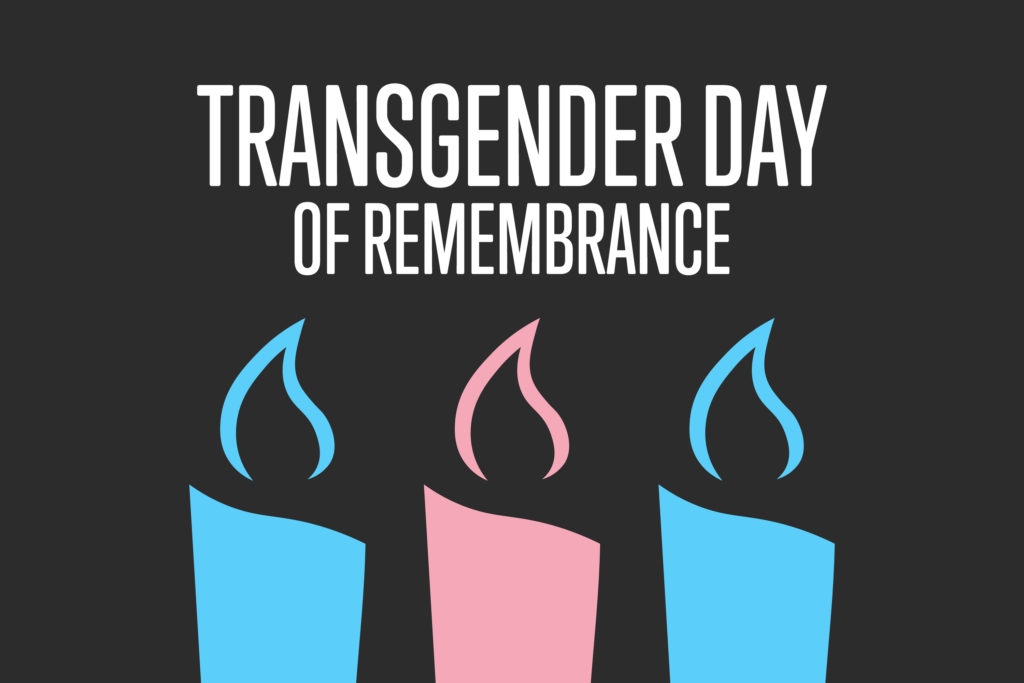Transgender Day of Remembrance, held annually on November 20, was founded after the 1998 murder of Rita Hester, Transgender Day of Remembrance honors the memories of those who have lost their lives due to anti-transgender violence and hate. The loss of transgender and gender non-conforming community members’ lives, including as a result of violence and hate, often goes unreported (or misreported) in the media.
Transgender Day of Remembrance serves to raise awareness about anti-transgender violence. Indeed, 2021 has seen more deaths by anti-transgender violence than any other year; this is true in the United States and globally. BIPOC transgender women and gender non-conforming people are disproportionately represented among the lives that have been lost. As we honor their lives and legacies, we must remember that anti-transgender hate is inherently connected to other forces of oppression, including anti-Blackness and systemic racism, misogyny, classism, ableism, xenophobia, and others.
Transgender Day of Remembrance is a time for us to collectively memorialize the lives of community members we have lost. This day also reminds us how important it is to affirm, support, and celebrate the livelihoods of transgender and gender non-conforming people in our families and communities. As healthcare providers, we can play an important role in educating ourselves and our peers, reducing stigma, addressing anti-transgender bias, and offering hope.
At LACDMH, we are working toward improving our system of care to better serve transgender community members and cultivate a welcoming environment for transgender staff. We recognize that transgender people have unique healthcare and social service needs, largely in response to the challenges of navigating daily hostility and anti-transgender bias. However, transgender community members also present for healthcare and other social services that have nothing to do with their gender identity. We encourage all service providers to practice an affirming, culturally responsive, and person-centered approach to care.
Here are a few steps you can take during Transgender Awareness Week (November 13 – 19) and Transgender Day of Remembrance:
- Educate yourself about the lived experiences of transgender people in the United States. Uplift the voices and testimonies of transgender people in your workplaces and communities.
- Learn about transgender lives, history, and terminology. There are lots of films, books, podcasts, TV series, websites, and social media pages that can help with this.
- Learn about the importance of pronouns. If you are a direct service provider, practice introducing yourself with your pronouns, and ask all your clients which pronouns they use when meeting someone for the first time. Add your pronouns to your email signature, display name on virtual platforms like MS Teams or Zoom, and business cards. This sends a powerful message that you acknowledge and respect diverse gender identities.
- Believe transgender people! Use the correct name and pronouns that a transgender person goes by, even if you don’t think you fully understand their perspective or experience.
- Respect transgender people’s privacy and confidentiality. Gender identity is personal, and everyone has the right to decide whether, when, how, or to whom they disclose their authentic gender. If you’re unsure whether it’s okay to share someone else’s gender identity, check with them first.
- Recognize and challenge anti-transgender discrimination, including microaggressions. Check out LA County’s campaign against targeted violence against transgender community members.
- Volunteer, donate, and/or spread the word about organizations working for transgender equality. Some local organizations to know include Gender Justice LA, Translatin@ Coalition, Bienestar, Center for Transyouth Health and Development at Children’s Hospital LA, and Trans Wellness Center.
- Engage with LACDMH’s growing community of staff who are invested in affirming healthcare for LGBTQIA2-S community members. Join our monthly DMH LGBTQIA2-S Workgroup and/or drop-in LGBTQIA2-S Clinical Consultation Team meetings, request a training for your program, or find out about the Gender Affirming Treatment Advocates. Together, we can make necessary changes to our daily practices and our system of care to promote hope and healing for transgender community members.

